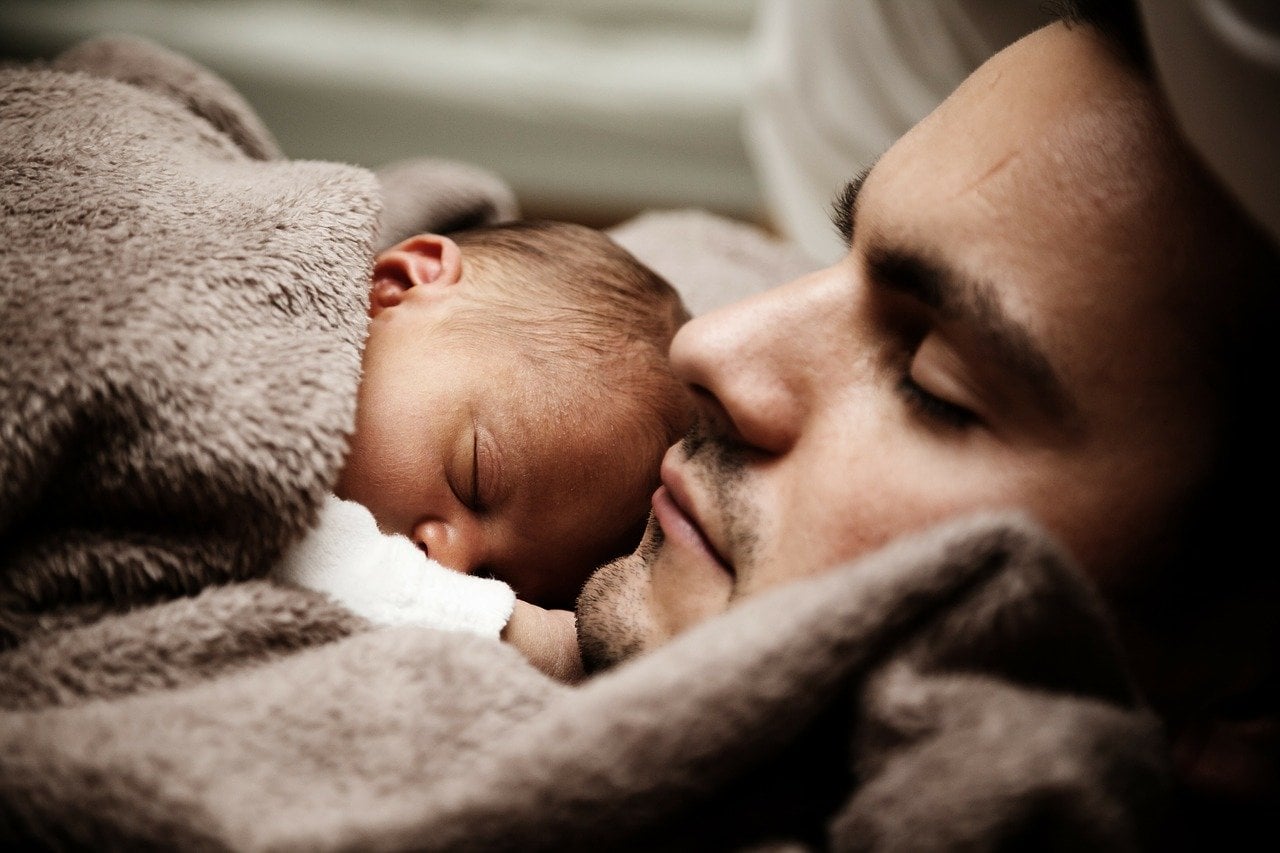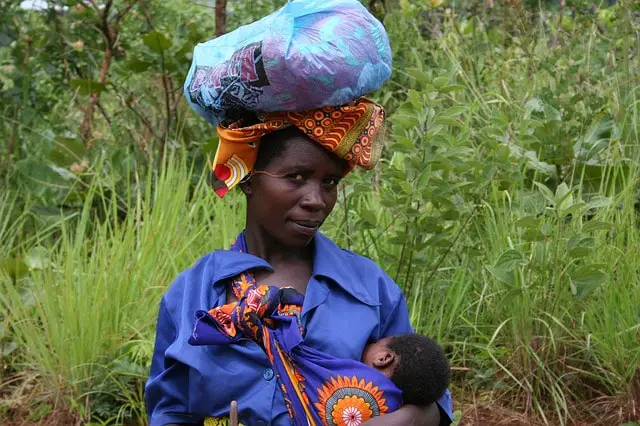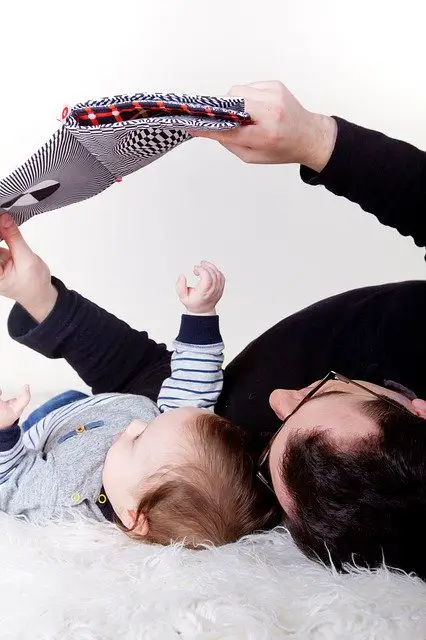Are you thinking about co-sleeping?
Are you debating the pros and cons of trying it out?
Is it as dangerous as social media, your friends and family and the internet make it out to be?
You may have heard many arguments for and against co-sleeping. Regardless of where you stand, there’s a lot of emotion that comes with just the idea of co-sleeping. Especially fear. Policies makers in the US frown upon the act, stating numerous reasons why it isn’t safe.
Yes, SIDS (Sudden Infant Death Syndrome) is a real problem in Africa, but there are many more factors involved than just sharing a bed with a child. Should you encourage your wife to co-sleep? Should you discourage her? Should you join her? In this article, we’re going to look at the idea of co-sleeping from a father’s perspective, giving you a chance to decide for yourself where you stand with co-sleeping.

Cultures Where Co-Sleeping Works
Japan and the Netherlands have the lowest rates of SIDS. I find Japan most interesting because they have a strong co-sleeping culture. Parents sleep on straw mats or futons with their children between them. They use the analogy of a river; the mother is one bank, the father is another, and the sleeping child between them is the water flowing between the banks. SIDS rates are currently approaching zero in Japan. This is a culture where children sleep with parents long after they’ve been weaned. Sometimes into their teenage years!
Co-sleeping or bed-sharing doesn’t just happen in Japan. Yes, it’s popular in the east, but just as popular in Latin America.
I think it’s a different perspective. In western countries, we ask: is co-sleeping bad? In Japan, the question they ask: is letting my child sleep alone bad for my kid and for me as parent?

Cultures Where Co-Sleeping is a Risk
Africa overall has high instances of SIDS. This is largely due to the lack of education in developing countries. However, some research has pointed to the fact that co-sleeping could cause infant suffocation. The issue here is not the co-sleeping itself – it’s how it’s being performed. Sometimes parents sleep with their infants on couches, or the parents themselves are intoxicated and are unresponsive when they roll onto their children.
Here’s the irony though. Some of the most successful co-sleeping cultures come from Africa. The !Kung tribe of Botswana sleep on the sandy ground, with their families together. The Efe people of Zaire sleep on a bed of leaves or between two logs for protection.
Education is the real key to successful co-sleeping.

Benefits and Concerns of Co-Sleeping
Co-sleeping has as many merits as it does concerns. With co-sleeping, mothers get a lot more sleep. Babies wake up numerous times in a night, and when the mother is nearby, the disruption in the sleep cycle is kept to a minimum. In some cultures, breast-sleeping has become a popular way of allowing mom to get the sleep she needs and baby to get breastmilk whenever they want. When positioned in the right way, this can be very effective. Just think about the strain it will take off your relationship when you and your spouse are getting more sleep. Studies have also shown that babies sync their heartbeats with their mothers. This creates greater harmony between them. With co-sleeping, this syncing is uninterrupted. There are also some benefits specifically for fathers. Evidence suggests that fathers as a result can have a prolonged intimate contact with their infants and it alleviates the distancing effects we experience due to the breast-feeding relationship. Other studies show that co-sleeping can even help our marriage. They found some surprising facts: fathers’ testosterone gets lowered. Dads this way will be less likely to look for certain fun activities outside their marriage. Can it save a marriage? Probably not. Can it contribute to a happier life for the family? Probably yes.

The downside to co-sleeping is that some parents can sleep heavily and restlessly. Smothering can happen. It’s unintentional, but it could lead to SIDS. If you don’t know how to make it work co-sleeping can lead to greater discomfort because even the biggest bed can become cramped. There’s also the danger of your child falling off the bed. Co-sleeping can also put the breaks on your sex life – not many women will feel romantic with their child in the bed with them.
Does any of this scare you?
Don’t let it. It’s all a matter of education.
Co-Sleeping Education for Dads
Education cures ignorance and builds logic to handle renegade emotions. Let’s take a look at somethings that you as a dad could do to create a successful co-sleeping experience.

1. Hit the Floor
Firstly, your bed needs to be close to the floor. Remove your bed base and take your mattress to the ground. This eliminates any height issues and any chances of your baby falling from a height that could be dangerous. Get as close to the floor as you possibly can, without sacrificing the quality of your mattress.
2. Simulate your Sleep
Next, practice your co-sleeping with a rolled-up towel, or a bag of rice, instead of your newborn. Go to sleep with this object between you and your lady on the bed. See what happens. Do you wake up in the middle of the night and find yourself crushing the towel or the packet? Trusting your sleeping habits and knowing what you do in your sleep will allow you to see if co-sleeping is viable for you.
3. Avoid Alcohol or Drugs
The biggest cause of infant suffocation by an adult comes from intoxication. When we’ve been drinking we’re heavy, our senses are dulled and we’re slow to respond. If you’re going to co-sleep, choose not to consume alcohol or drugs. If you are going to, then don’t co-sleep.
4. Use Barriers
Place a rolled-up towel between you and your baby. This creates a barrier so that if you do move around in your sleep, you have extra protection for your child. This technique has been known to help with co-sleeping.
5. Lose the Blankets
Blankets, sheets and duvets can smother an infant. Dress warmly before bed so that you don’t need blankets or sheets. When you don’t need these extra layers, you practically eliminate the possibility of tangling your baby in sheets or smothering them with a duvet. This dramatically decreases any chances of your baby’s breathing being blocked by blankets.
There, feeling better? Co-sleeping doesn’t have to be dangerous. If you’re willing to learn, and potentially change your sleeping habits, then co-sleeping can bring you and your family closer together.
6. Don’t listen to the Haters
Recently, there was a story that went viral on social media. A dad posted a picture of his wife co-sleeping with their child. More than 500 000 people shared the post. The debate raged on with people supporting the act, and others calling it negligence. Did any of the advice or the flack help? Who knows. However, bear in mind that you will receive similar responses when you speak about co-sleeping with your family and friends. At the end of the day, you need to do what’s best for your family. Ignore the haters. Their hate, mostly, is founded on illogical fear.

Is co-sleeping for you?
The real issue with co-sleeping in the west is that there’s a stigma attached to it. Whereas in other parts of the world, it’s an accepted practice. Remember, you need to do what is right for your family. Have this discussion with your wife or girlfriend. Find out where she stands on the issue. Come to an agreement. There’s a lot of grey area in co-sleeping. Many of the horror stories that you will hear about it are just that – stories.
Who knows, maybe you’ll find that co-sleeping is the best way forward for your family. Enjoy the journey. Learn from it and share. As fathers, that’s what we can do to enhance our community and pave the way for those that are coming after us.

